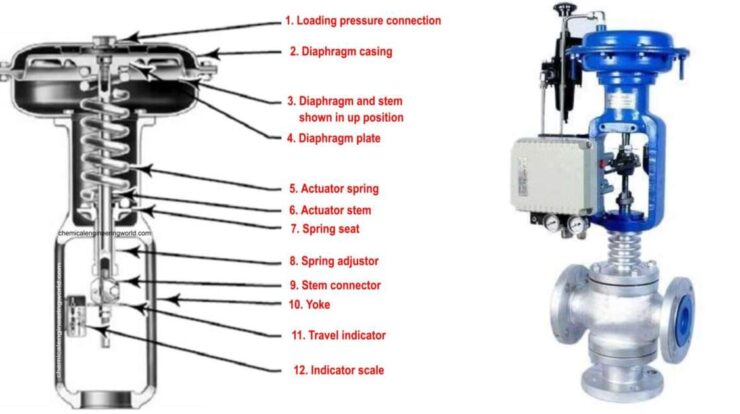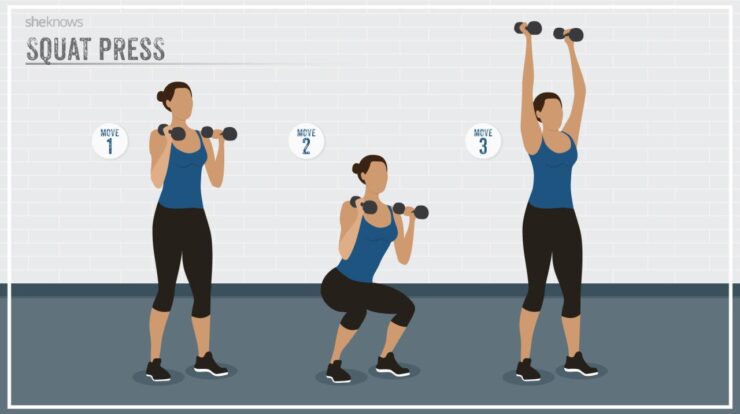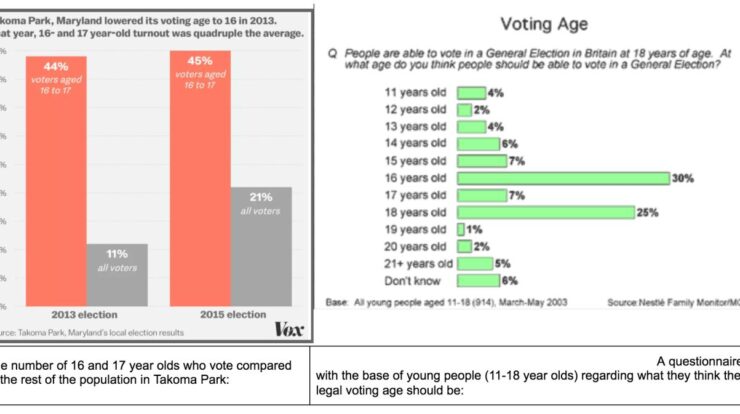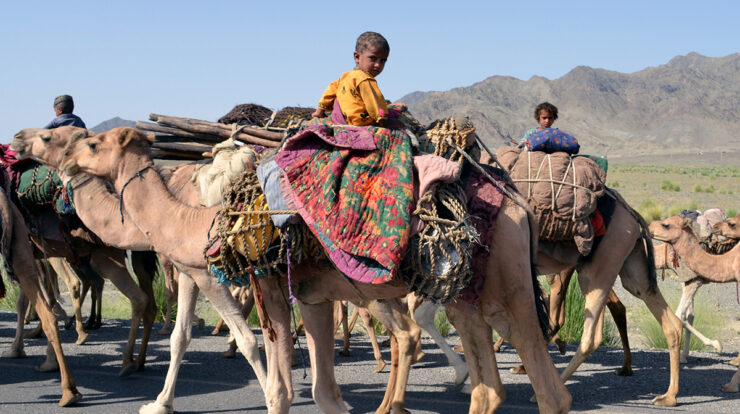Summer hazards for elderly – Summer brings sunshine and warmth, but it also poses unique hazards for the elderly. From heat-related illnesses to insect bites, it’s crucial to be aware of the risks and take precautions to stay safe and healthy.
The following guide provides a comprehensive overview of summer hazards for the elderly, including tips for prevention and treatment.
Heat-Related Illnesses
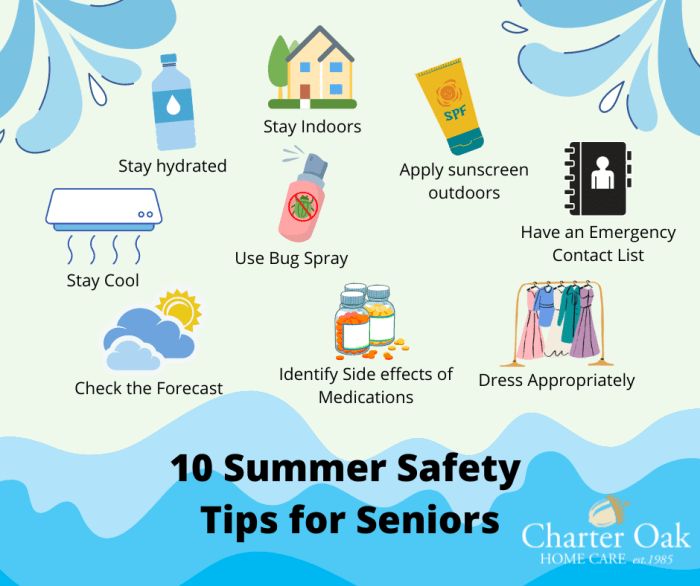
During the summer months, it’s important for the elderly to be aware of the dangers of heat-related illnesses. These illnesses can be serious, even life-threatening, so it’s important to know the signs and symptoms, risk factors, and how to prevent them.
Summer poses significant health risks for the elderly, including heat stroke, dehydration, and sunburn. To combat these hazards, seniors should take precautions to stay cool, such as staying cool in summer for seniors . By following these guidelines, seniors can minimize their risk of heat-related illnesses and enjoy the summer months safely and comfortably.
Signs and Symptoms, Summer hazards for elderly
Heatstroke is the most serious heat-related illness. It occurs when the body’s temperature rises to dangerous levels, often due to prolonged exposure to high temperatures or strenuous activity in hot weather. Symptoms of heatstroke include:
- High body temperature (103°F or higher)
- Hot, red, dry, or damp skin
- Fast, strong pulse
- Headache
- Nausea
- Confusion
- Seizures
- Loss of consciousness
Heat exhaustion is less severe than heatstroke, but it can still be serious. Symptoms of heat exhaustion include:
- Heavy sweating
- Cold, pale, clammy skin
- Fast, weak pulse
- Nausea
- Vomiting
- Headache
- Dizziness
- Fatigue
Heat cramps are the least severe heat-related illness. They occur when the body loses too much salt and water through sweating. Symptoms of heat cramps include:
- Muscle cramps in the arms, legs, or abdomen
- Painful muscle spasms
Risk Factors
The elderly are at an increased risk for heat-related illnesses because their bodies are less able to regulate temperature. This is due to a number of factors, including:
- Decreased sweating
- Reduced blood flow to the skin
- Changes in the way the body produces and uses energy
- Certain medications
- Chronic health conditions
Prevention
There are a number of things that the elderly can do to prevent heat-related illnesses, including:
- Staying hydrated by drinking plenty of fluids, even if they don’t feel thirsty
- Avoiding strenuous activity during hot weather
- Spending time in air-conditioned areas
- Wearing loose-fitting, light-colored clothing
- Taking cool showers or baths
- Eating fruits and vegetables that are high in water content
If you think someone is experiencing a heat-related illness, call 911 immediately.
Sun Exposure
Spending time outdoors during summer can be enjoyable, but it’s essential to be aware of the risks associated with excessive sun exposure. The sun’s ultraviolet (UV) radiation can have harmful effects on the skin, including sunburn, skin cancer, and premature aging.
Effects of UV Radiation on the Skin
- Sunburn:UV radiation damages the DNA in skin cells, causing inflammation and redness. Severe sunburn can lead to blistering and pain.
- Skin Cancer:Prolonged exposure to UV radiation can increase the risk of developing skin cancer, including melanoma, the most serious type.
- Premature Aging:UV radiation breaks down collagen and elastin, the proteins that give skin its firmness and elasticity. This can lead to wrinkles, sagging, and age spots.
Importance of Sunscreen and Protective Clothing
The best way to protect yourself from the harmful effects of sun exposure is to use sunscreen and wear protective clothing. Sunscreen blocks or absorbs UV radiation before it can reach the skin, while protective clothing provides a physical barrier between the skin and the sun.
Choosing and Applying Sunscreen
As summer approaches, it’s crucial to be aware of the potential hazards that can affect elderly individuals. One of the most significant risks is heatstroke, which can occur when the body’s temperature rises to dangerous levels. To prevent heatstroke, seniors should take precautions such as staying hydrated, wearing loose-fitting clothing, and seeking shade during the hottest hours of the day.
More information on heatstroke prevention for seniors can be found at heatstroke prevention for seniors . By following these tips, elderly individuals can reduce their risk of heat-related illnesses and enjoy the summer safely.
- SPF:Sunscreen is rated by its sun protection factor (SPF), which indicates how well it protects against UVB rays, the rays that cause sunburn. Choose a sunscreen with an SPF of 30 or higher.
- Broad Spectrum:Sunscreen should be broad spectrum, meaning it protects against both UVA and UVB rays.
- Water Resistance:Sunscreen should be water resistant for at least 80 minutes. This means it will remain effective even after swimming or sweating.
- Application:Apply sunscreen liberally to all exposed skin, including the face, ears, neck, hands, and feet. Reapply every two hours or more often if swimming or sweating.
Dehydration
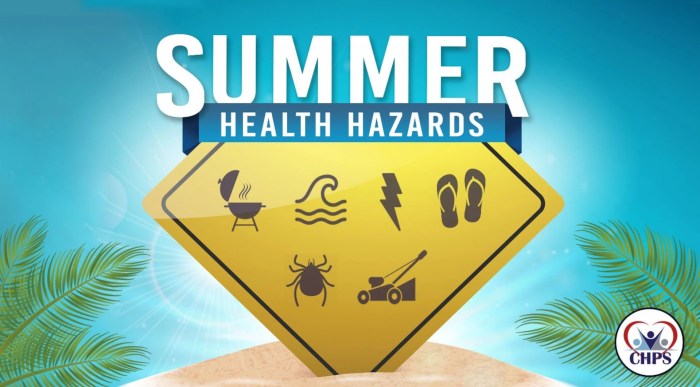
Staying hydrated is crucial, especially during hot weather. When the body loses more fluids than it takes in, it can lead to dehydration, a potentially dangerous condition that can affect the elderly more severely due to reduced thirst sensation and decreased body water content.
Dehydration can manifest in various ways, including dizziness, fatigue, muscle cramps, and confusion. If left untreated, it can progress to heat exhaustion and heatstroke, both of which can be life-threatening.
Preventing Dehydration
Preventing dehydration is essential, and there are several simple steps that can be taken to ensure adequate hydration:
- Drink plenty of fluids:Water is the best choice, but other fluids such as electrolyte-rich sports drinks or fruit juices can also help.
- Eat fruits and vegetables:Fruits and vegetables are high in water content and can help contribute to overall fluid intake.
- Avoid sugary drinks:Sugary drinks can actually worsen dehydration, as they can cause the body to lose more water.
- Limit alcohol and caffeine:Alcohol and caffeine can also contribute to dehydration.
- Stay cool:Staying in cool environments and avoiding strenuous activity during the hottest hours of the day can help reduce fluid loss.
By following these tips, elderly individuals can help prevent dehydration and stay healthy during hot weather.
Foodborne Illnesses
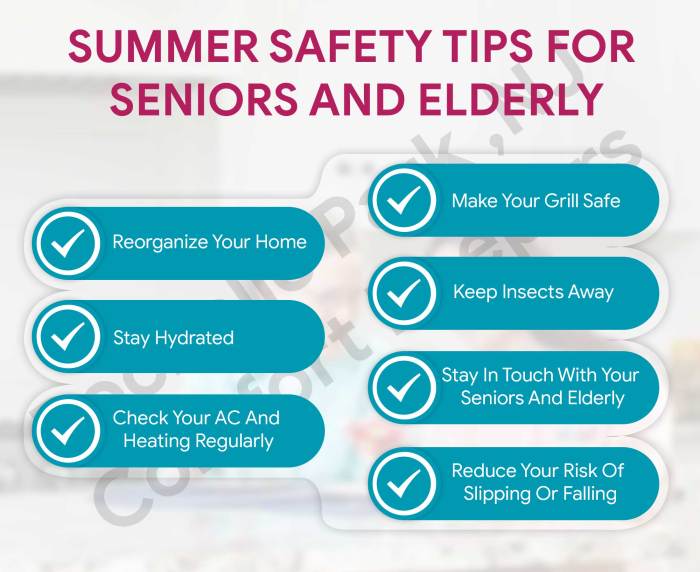
Foodborne illnesses are a common health hazard for the elderly, especially during the summer months. These illnesses can be caused by bacteria, viruses, or parasites that are found in food that has been contaminated.
The elderly are at an increased risk for foodborne illnesses because their immune systems are often weaker than those of younger people. Additionally, they may have other health conditions that make them more susceptible to infection.
Risk Factors
- Eating raw or undercooked meat, poultry, or seafood
- Consuming unpasteurized milk or juice
- Eating food that has been left out at room temperature for too long
- Eating food that has been contaminated with bacteria from dirty hands or surfaces
Symptoms
The symptoms of foodborne illnesses can vary depending on the type of bacteria or virus that caused the illness. However, some common symptoms include:
- Nausea
- Vomiting
- Diarrhea
- Abdominal pain
- Fever
- Chills
- Headache
- Muscle aches
Prevention
There are a number of things that the elderly can do to prevent foodborne illnesses:
- Practice good food hygiene, such as washing hands thoroughly before handling food, and washing fruits and vegetables before eating them.
- Cook food thoroughly to kill bacteria.
- Do not eat raw or undercooked meat, poultry, or seafood.
- Do not consume unpasteurized milk or juice.
- Do not eat food that has been left out at room temperature for more than two hours.
Insect Bites and Stings: Summer Hazards For Elderly
Insect bites and stings are common hazards during the summer, especially for the elderly. The elderly have a weaker immune system, making them more susceptible to the effects of insect bites and stings. Insect bites and stings can cause pain, swelling, itching, and in some cases, more serious health problems.
Summer brings many hazards for the elderly, including heat stroke and dehydration. However, one of the most important things to remember is sun safety. As we age, our skin becomes more sensitive to the sun’s rays, so it’s important to take precautions to protect ourselves.
For more information on how to stay safe in the sun, check out sun safety tips for older adults . By following these tips, you can help reduce your risk of developing skin cancer and other sun-related health problems.
Symptoms
The symptoms of insect bites and stings vary depending on the type of insect. Some common symptoms include:
- Pain
- Swelling
- Itching
- Redness
- Warmth
- Pus or drainage
- Fever
- Chills
- Nausea
- Vomiting
- Difficulty breathing
- Anaphylaxis (a severe allergic reaction that can be life-threatening)
Prevention
There are a number of things you can do to prevent insect bites and stings:
- Use insect repellent.
- Wear protective clothing.
- Avoid areas where insects are known to be present.
- Keep your home and yard clean and free of debris.
- Inspect your skin for ticks after spending time outdoors.
- Remove ticks promptly and properly.
Outdoor Activities
Participating in outdoor activities can provide numerous benefits for the elderly, including improved physical and mental health. Fresh air and sunshine can boost mood, increase vitamin D levels, and strengthen bones. Exercise from outdoor activities can improve mobility, flexibility, and balance, reducing the risk of falls.
Social interaction during group activities can combat loneliness and provide a sense of community.However, it’s crucial for the elderly to take precautions when engaging in outdoor activities, especially during hot weather. Staying hydrated by drinking plenty of fluids is essential to prevent dehydration.
Wearing sunscreen with an SPF of 30 or higher and reapplying it regularly protects the skin from harmful UV rays. Avoiding strenuous activity during the hottest hours of the day, typically between 10 am and 4 pm, is also advisable.When
choosing outdoor activities for the elderly, it’s important to consider their physical abilities and interests. Gentle activities like walking, gardening, or tai chi are suitable for most seniors. Supervised swimming or water aerobics can provide a low-impact workout. For those who enjoy socializing, group activities like walking clubs or senior centers offer opportunities for interaction and companionship.
Outcome Summary
By following these tips and being mindful of the risks, seniors can enjoy the summer months safely and comfortably. Remember to stay hydrated, protect yourself from the sun, and take precautions against falls and other hazards.
Query Resolution
What are the signs of heatstroke?
Signs of heatstroke include high body temperature, confusion, dizziness, nausea, and rapid heart rate.
How can I prevent dehydration?
To prevent dehydration, drink plenty of fluids, especially water, and eat fruits and vegetables that are high in water content.
What should I do if I get a tick bite?
If you get a tick bite, remove the tick promptly with tweezers and clean the area with soap and water. Monitor for signs of infection, such as redness, swelling, or fever.


